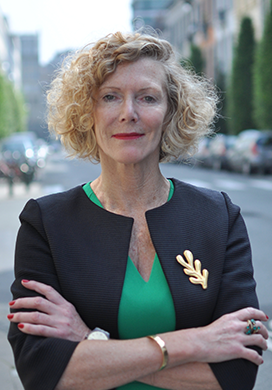We all knew Brussels insiders would either love or loathe POLITICO – but that they’d be hard-pressed to ignore the brassy American interloper which burst onto the European capital a year ago.
And that’s the way executive editor Matthew Kaminski wants it. “I would rather be read than loved,” says the former Wall Street Journal writer of Polish origin and American education. He is vehement that “we are not here to be in anyone’s pocket or to support the European project”.
With journalist numbers now at 50, mostly based in Brussels, but also in London, Paris and Berlin, Kaminski says POLITICO has had a “very very strong” first year. Specialist coverage has steadily grown to span technology, financial services, health, energy, trade and soon agriculture.
According to our informal survey of EU movers and shakers working in a variety of areas, the joint venture between the original POLITICO and German publishing giant Axel Springer has certainly shaken up coverage of the notoriously dry EU. (That most of those quizzed wish to remain anonymous speaks volumes about its influence.)
“There is little doubt that POLITICO has reinvigorated the Brussels media landscape. It’s made Brussels-centric debates available to wider audiences and brought a reporting style unseen before in the EU capital,” says one technology subscriber.
Frédéric Simon, publisher and editor of rival EU specialist outlet EurActiv agrees. “For sure, POLITICO has dramatically changed the Brussels media landscape. Partly because of European Voice’s disappearance but also because of POLITICO’s reporting style, big budget and staff numbers.”
In the eyes of Robert McLeod, co-founder and chief executive officer, of MLex, which covers regulatory risk: “They’ve brought a liveliness to the political debate in Europe that wasn’t there before and they’ve not been afraid to tackle controversial issues such as the aftermath of the Brussels bombing.”
In the eyes of a technology industry executive: “It has increased competition between media organisations and shaken up the cosy consensus. No disrespect to the Financial Times, but it’s no longer perceived as the automatic ‘paper of record’ in the Brussels beltway.”
A financial services reader observes that the arrival of POLITICO has forced others in the ‘Brussels bubble’ to up their game. “The EurActiv news team now has more liberties to engage on topics than they would normally only cover when a sponsor was involved.”
Shortly after POLITICO’s European launch, the Guardian ran an article asking whether it would make the often-technical EU dossier sexy. Not many would go so far as to say it has managed that, even though most welcome its fresh approach and lively writing.
“It’s not making the EU sexy – that’s impossible,” says the technology executive, adding that POLITICO is however making it more accessible.
While EurActiv’s Simon does think POLITICO has spiced up Brussels coverage, he sees downsides. “I believe POLITICO has succeeded in making the EU sexier but the flipside of this has been some kind of dumbing-down when it comes to the substance. Some stories have overstretched the truth to make themselves more attractive, which led to a loss of credibility.”
The financial services reader says: “There is a dumbing-down aspect, but it certainly has made the EU more lively. The ‘American approach’ is great, but often still lacks in-depth insights that you need to fully understand EU developments.”
Kaminski disagrees that POLITICO is dumbing-down coverage of the EU, arguing it has as many “policy wonks” as any other publication in Brussels. In the London-based head of the financial services team, Francesco Guerrera, for example, POLITICO certainly has a heavyweight journalist.
Some question POLITICO Europe’s hiring policy. With total staff numbers including 19 nationalities from three continents, many of its journalists have little experience of covering Europe, even if 79% do hold EU passports.
But Thomas Spiller, who heads European public policy for Walt Disney, does not see the hiring of reporters from outside Europe as a negative. “I always like a bit of fresh air. The fact that they come from other parts of the world is a plus.”
All those surveyed say the jewel in POLITICO’s crown is the inimitable Ryan Heath, whose sparkling Playbook column Brussels wakes up to each morning.
“POLITICO’s greatest success is Ryan Heath’s Playbook, which has succeeded in generating buzz and driving a big audience to the website,” says EurActiv’s Simon. The technology subscriber agrees: “It is unbelievable how relevant and influential Ryan is when it comes to setting the agenda”.
Kaminski recognises that Ryan Heath is “a very valuable part of the team” but says the former European Commission spokesman “couldn’t do what he does without the support of the newsroom” and notes that POLITICO has many other prominent journalists.
Others praise POLITICO’s coverage of Belgium in more depth than other international publications. Walt Disney’s Spiller, a long-time Brussels resident, says: “So many expats live and work in this town – we pay taxes here – and yet we often don’t know what’s going on in Belgium. It’s great to see POLITICO covering Belgium seriously.”
Whether it’s thumbs up or down to POLITICO after its first year, one thing is clear. The American-German hybrid has such deep pockets that it looks set to stay for some time yet.
Photo credit Politico Europe
